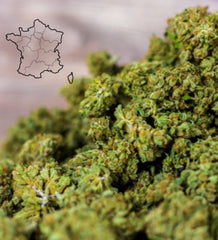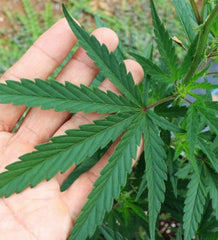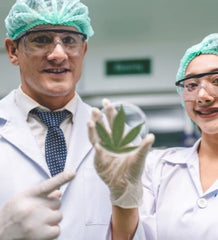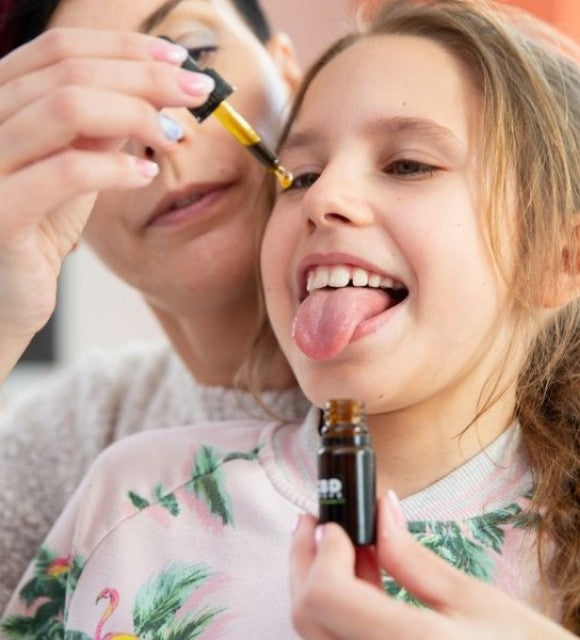
Can you give CBD to children?
What is CBD?
CBD is a cannabinoid molecule derived from hemp . Like THC (tetrahydrocannabinol), CBD is found specifically in hemp flowers. Extracting it requires several steps to separate each molecule and extract only the CBD. To be legal, CBD must not contain more than 0,3% THC. This level guarantees the absence of psychoactive effects. This is the case for products sold in France.
Considered the molecule of well-being, CBD is renowned for its multiple therapeutic benefits. Consumed wisely, it provides relief and relaxation in a gentle and natural way.
What are the effects of CBD?
CBD is known to relieve everyday ailments such as migraines, muscle tension , sleep and mood disorders , lack of concentration and even stress . All these benefits are made possible thanks to the fixation of CBD on receptors distributed throughout our body. CBD therefore does not have a targeted action, but is beneficial for both the body and the mind.
When you use CBD, you will naturally improve your well-being . You can either consume it as a preventative measure before a stressful event or before going to bed if you know in advance that you will not be able to sleep, for example.
Additionally, you can choose a method that allows you to feel its effects throughout the day. The diversity of CBD uses and formats is a powerful advantage. This also allows it to be consumed by different people with varying habits.
Why is CBD not a narcotic?
CBD is often associated with THC, which is another cannabinoid . The difference is that THC is considered a narcotic, while CBD is not. Using the latter will not give you the same sensations as smoking a joint, as you might think. The reason is that they are two different molecules that act differently in our bodies. When you consume them, they will not activate the same receptors and therefore have the same effects.
There are no risks in using CBD if you follow the directions for use, choose the right products, and have no contraindications from your doctor. It's a natural product, and most uses are healthy for the body. When this isn't the case, be aware that this means it's against the law.
For example, you should not smoke CBD flowers because when they are burned, the smoke released is toxic. Therefore, it is recommended to make infusions , use them in cooking or vaporize them, which is much better for your health.
What are the different CBD products?
On the market, you can find both raw and derived products. The first category includes flowers , wax, pollen, oil, and resin. In this form, you can be sure that the CBD will be natural since no other ingredients are added.
Then there are CBD-based derivatives. These mainly include food products like candy or cakes, as well as cosmetics like skin creams or gels. Another popular derivative product is CBD-enriched e-liquid .
All these products have the same effects, only the assimilation will be different. When you ingest CBD directly, you will first have to digest it before you can feel its effects. However, when you smoke or vaporize CBD , the benefits will be instantaneous . As for cosmetics, this allows you to target a part of the body with more precision.
For children, we often think of CBD oils , herbal teas and gummies.
Who can use CBD?
So, since CBD is natural, most consumers seem to think anyone can use it. With so many products available on the market, everyone will find a suitable method for effective consumption.
However, it's possible to compare it to dietary supplements, which are also controversial. While they can be used without prior medical advice and are easily purchased, they aren't necessarily suitable for everyone. It's the same with CBD!
What are the contraindications associated with the use of CBD?
CBD may be contraindicated in several situations. First, we don't have enough information on this molecule, so we can't yet establish a fixed limit for the amount to consume per day. It is possible to determine how much CBD is needed to feel its effects based on your weight, but this isn't a safe technique since everyone has different sensitivities.
Some people are used to it and can therefore consume a lot before feeling the effects, and conversely, others are much more receptive to it. It's best to start with small doses, then increase according to your feelings. Be careful, too much can have adverse effects.
Additionally, if you have health issues, you probably have the reflex to seek the advice of your doctor regularly when you change your habits in order to preserve your health. This is essential to ensure you make the right decisions and know in advance if this change is compatible with your illness, treatment or disorder. This habit is essential and it is also necessary before consuming CBD. If you have any doubts, consulting your doctor is the first thing to do before using CBD for the first time.
In some situations, brands directly advise against the consumption of their CBD products. Obviously, pregnant and breastfeeding people must take even more precautions than usual, and therefore it is not recommended for them to use CBD. For people with arterial or heart problems, it is also best for them to avoid consuming it, and if they really want to, then they should first talk to their doctors.
Can children safely use CBD?
When it comes to children's use of CBD, opinions vary. Some see no harm in it since it's a natural active ingredient like many others. Others consider it too dangerous to use at a young age because there's always a bit of THC associated with CBD.
Indeed, it is difficult to separate each cannabinoid molecule and therefore to obtain CBD without any THC. In terms of legislation, there are no specific prohibitions for children. Therefore, if your child has no contraindications, it is possible to give them CBD to help them feel better naturally.
Keep in mind, however, that it's difficult to know in advance how your child will react to using CBD, and whether any lasting effects will occur. However, it can be a good solution from time to time to help them calm down, regain their appetite, reduce stress, or even sleep better.
Pay attention to the dosages, since they are smaller than ours, you will have to use products with a low concentration of CBD.
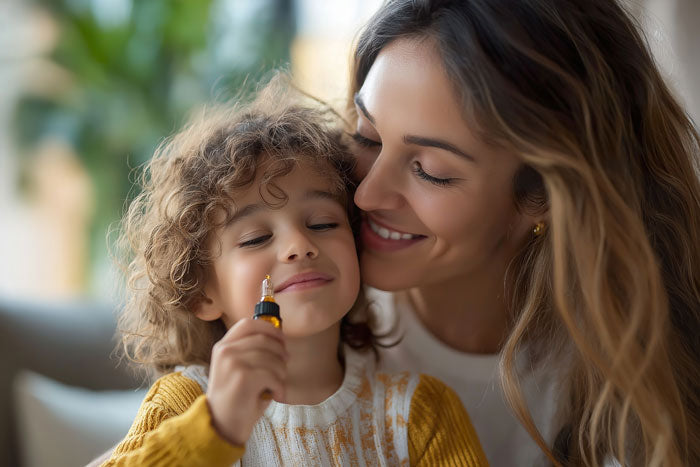
So you have the choice of giving CBD to your children or not. Find out beforehand about the dosages, possible uses and effects in order to best support your child. We still advise you to wait until they are a certain age before having them use CBD to avoid any risk of bad reactions .
When can children use CBD?
First, it's important to remember that the sale of CBD to minors is prohibited. Without parental consent, a child under 18 cannot consume CBD alone. Medical advice is not mandatory, but it is strongly recommended.
Thanks to its relaxing and soothing properties , CBD can be used in children for:
- sleep disorders such as insomnia;
- stress, anxiety, anguish and phobias;
- irritability, nervousness and mood disturbances;
- attention and concentration disorders linked to hyperactivity .
What do scientists say about CBD in children?
Scientific studies have highlighted the effectiveness of CBD in children, particularly in the context of epilepsy, Dravet syndrome and Lennox-Gastaut syndrome .
In France, there is a CBD-based medication: Epidyolex. This CBD-based medication is approved for the treatment of severe forms of epilepsy in children. However, it is only prescribed by a doctor and available with a prescription.
CBD treatment can reduce the frequency of epileptic seizures by at least 50% . This rate of effectiveness is comparable to that of conventional anti-epileptics. Used for epilepsy resistant to drug treatment, CBD treatment is a natural alternative.
In conclusion, can we give CBD to children?
In France, CBD is prohibited for sale to minors. While consumption is not formally prohibited, it is not explicitly recommended either.
As with any new product or molecule that you wish to administer to your child, professional advice is recommended.
Yes, you can use CBD to soothe your child's aches and pains, but caution is advised. As a precaution, we encourage you to seek advice from your doctor.
Of course, CBD should not be left within reach of children and should always be supervised by an adult. Risks of overdose include drowsiness, nausea, and dry mouth.



